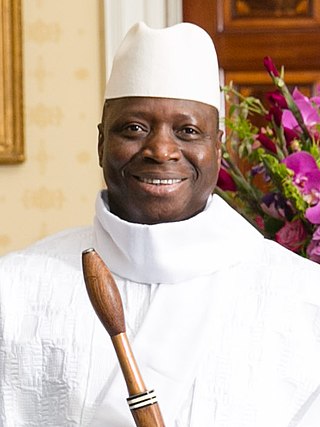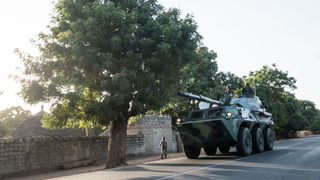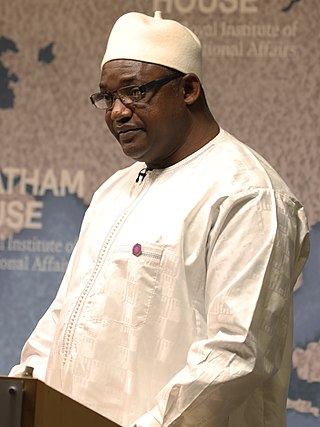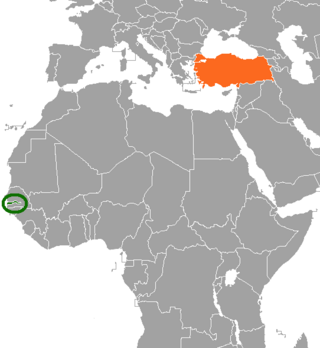Related Research Articles

Senegal's first President,Léopold Senghor,advocated close relations with France and negotiation and compromise as the best means of resolving international differences after Senegal's independence from its status as a French colony. To a large extent,the two succeeding presidents,Abdou Diouf and Abdoulaye Wade,have carried on Senghor's policies and philosophies. Senegal has long supported functional integration among French-speaking West African states through the West African Economic and Monetary Union.

The Gambia,officially the Republic of The Gambia and Gambia,is a country in West Africa. Geographically,Gambia is the smallest country in continental Africa;it is surrounded by Senegal,except for its western coast on the Atlantic Ocean. It is situated on both sides of the lower reaches of the Gambia River,which flows through the centre of the country and empties into the Atlantic Ocean. The national namesake river demarcates the elongated shape of the country,which has an area of 11,300 square kilometres (4,400 sq mi) and a population of 2,468,569 people in 2024. The capital city is Banjul,which has the most extensive metropolitan area in the country;the second- and third-largest cities are Serekunda and Brikama.

The first written records of the region come from Arab traders in the 9th and 10th centuries. In medieval times,the region was dominated by the Trans-Saharan trade and was ruled by the Mali Empire. In the 16th century,the region came to be ruled by the Songhai Empire. The first Europeans to visit the Gambia River were the Portuguese in the 15th century,in 1447,who attempted to settle on the river banks,but no settlement of significant size was established. Descendants of the Portuguese settlers remained until the 18th century. In the late 16th century,English merchants attempted to begin a trade with the Gambia,reporting that it was "a river of secret trade and riches concealed by the Portuguese."

Yahya Abdul-Aziz Jemus Junkung Jammeh is a Gambian politician and former military officer,who served as President of the Gambia from 1996 to 2017,as well as Chairman of the Armed Forces Provisional Ruling Council from 1994 to 1996.
Momodou Lamin Sedat Jobe was the Gambian Foreign Minister from 1998 to August 2001. He now lives in self-imposed exile in Sweden and is currently heading the pro-democracy Gambia Consultative Council,which was established in 2013.

In the 1994 Gambian coup d'état,a group of soldiers led by 29-year-old Lieutenant Yahya Jammeh seized power in a bloodless coup d'état on the morning of 22 July,ousting Dawda Jawara,who had been President of The Gambia since it became a Republic in 1970.
Buba Sidiki Michael Baldeh was a Gambian politician,journalist and editor. He was a former managing editor of The Daily Observer,a Gambian daily newspaper,from 2000 to 2002. Baldeh was also a former member of the National Assembly of the Gambia from 1982 to 1985 and 1987-1994 during the first Gambian republic. Buba also served as Minister of Youths and Sports during the first Republic from 1992 to 1994. He survived by 8 Children and with two wives. Buba subsequently went on to serve several posts after the 1994 coup d’tat until his fall out with the then President of The Republic of The Gambia Yahya Jammeh.
The 2014 Gambian coup d'état attempt broke out during the night of 30 December 2014,when gunfire erupted in the Gambian capital of Banjul.

Malaysia–The Gambia relations refers to bilateral foreign relations between the two countries,Malaysia and The Gambia. Malaysian embassy in Dakar,Senegal is accredited to The Gambia while Gambian embassy in Abu Dhabi,United Arab Emirates is accredited to Malaysia. The relations are friendly and warm.
Mambury Njie is a Gambian politician and the current Minister of Finance and Economic Affairs in Adama Barrow's cabinet.
Madieng Khary Dieng was a Senegalese politician,who was a member of the Socialist Party. He served as a government minister several times during Abdou Diouf's presidency.

Adama Barrow is a Gambian politician and real estate developer who has served as President of the Gambia since 2017.

A constitutional crisis occurred in Gambia following presidential elections in December 2016,in which challenger Adama Barrow achieved an upset victory over longtime incumbent Yahya Jammeh. It eventually concluded after a military intervention by the Economic Community of West African States (ECOWAS) led to Jammeh’s departure from the country.

The ECOWAS military intervention in the Gambia or the ECOWAS Mission in The Gambia –initially code-named Operation Restore Democracy –is a military intervention in The Gambia by several member states of the Economic Community of West African States.

United Nations Security Council Resolution 2337 was a measure unanimously adopted by the United Nations Security Council (UNSC) on 19 January 2017. It expressed support for efforts by ECOWAS to peacefully resolve the 2016–2017 Gambian constitutional crisis,calling on President Yahya Jammeh to step down and allow a peaceful transition to the President-elect,Adama Barrow,as well as supporting the African Union and ECOWAS decisions in recognizing Adama Barrow as the new president. The measure was adopted by a vote of 15 supporting,none opposed,and none abstained.
The following lists events in the year 2017 in the Gambia.

Following his victory in the presidential election on 1 December 2016,the newly elected President Adama Barrow appointed a new cabinet to succeed the cabinet of Yahya Jammeh,his predecessor. Barrow was formally inaugurated on 19 January 2017 at the embassy of the Gambia in Dakar,Senegal,and was able to return the Gambia on 26 January. He made the bulk of appointments in February 2017,and conducted major reshuffles in June 2018,March 2019 and May 2022.

TheGambia–India relations refers to the international relations that exist between The Gambia and India. The Gambia maintains a High Commission in New Delhi. The Embassy of India in Dakar,Senegal is concurrently accredited to The Gambia,the only Anglophone country accredited to that mission. India also maintains an Honorary Consulate General in Banjul.

Gambia–Turkey relations are the foreign relations between Gambia and Turkey.
References
- ↑ "Index Sa". Rulers.org. Retrieved 12 December 2015.
- 1 2 3 4 5 6 "Sidi Sanneh Interview". Maafanta. Retrieved 12 December 2015.
- ↑ "The Gambia now an Islamic republic, says President Yahya Jammeh". The Guardian. 12 December 2015. Retrieved 13 December 2015.